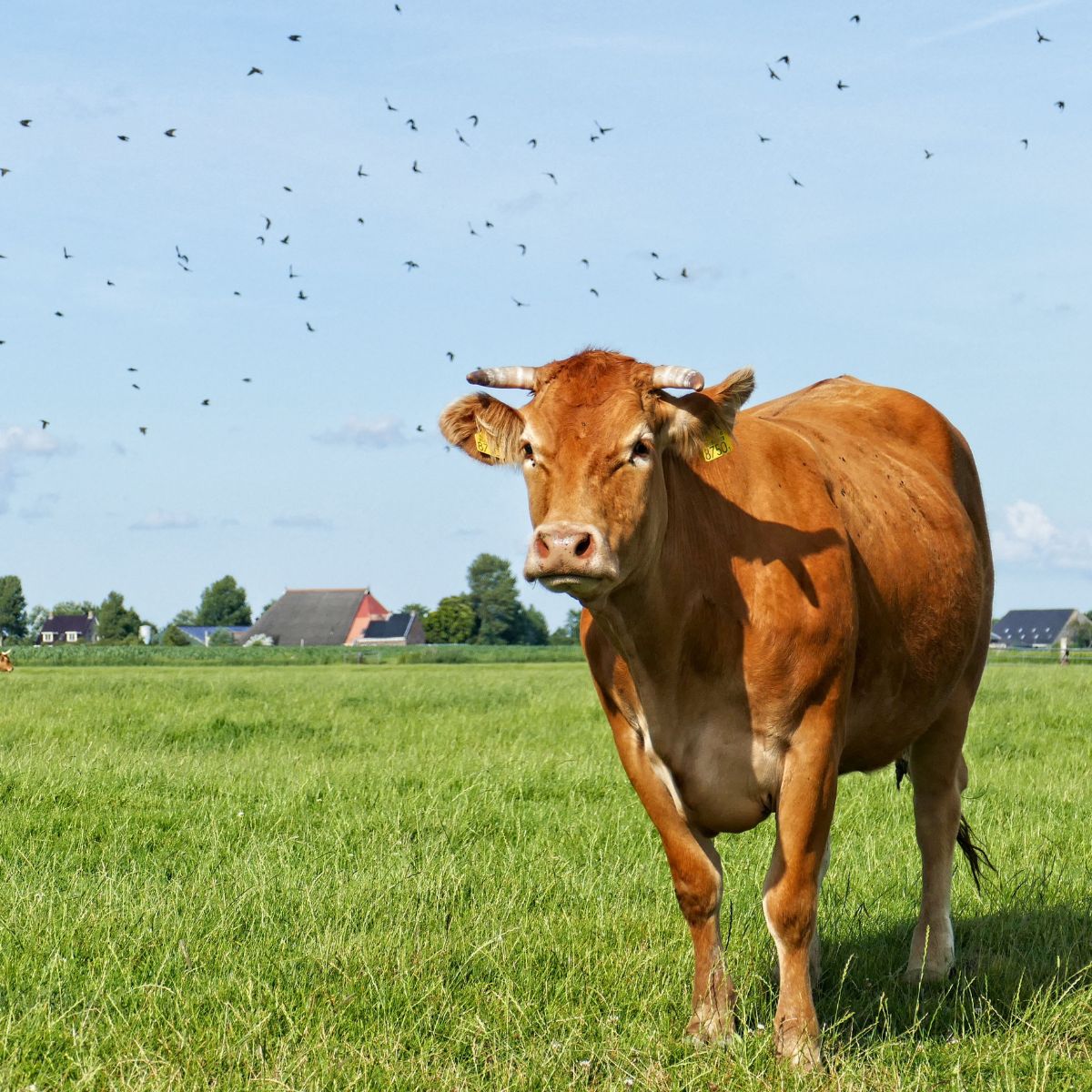

The global market for grass-fed beef is expected to grow to a valuation of more than $13 billion US dollars by 2025, an increase owing to “the flourishing trend of cleaner meat consumption.”[1] Reports forecast similar gains for the global organic meat products market.[2]
We’ve previously discussed the arguments for and against grass-fed animal food products; I won’t review those arguments in detail here. If you’re curious to learn more, here are some resources for you to check out:
- Grass-Fed Animal Agriculture
- The Environmental Case For Free-Range Livestock?
- Regenerative Grazing: Not As Sustainable As We Think
There are also several environmental or ethical arguments for consuming organic meat, but again, these are not the focus of this article. Here, the question is purely from a nutritional standpoint: is organic meat truly a “cleaner” option?

Arguments in Favor of Organic Meat
In a meta-analysis comparing the nutrient composition of organic and conventional meat products, researchers found almost no significant difference. One area that did show a difference—favoring organic meat over conventional meat—was in the fatty acid profiles: when the researchers pooled the data from all livestock species, they found significantly more omega-3 fatty acids and total polyunsaturated fatty acids.[3]
According to the authors, this difference can be attributed primarily to “the high grazing/forage-based diets prescribed under organic farming standards,” as opposed to conventional feeds that are high in corn, cereals, soy, and animal byproducts.
In another study, this time comparing beef specifically, researchers concluded that the organic option “had a higher nutritional value,” with less cholesterol and higher levels of antioxidants.[4] Again, this comes back to the feed. If the diet of the cow you’re eating was of a higher quality—containing more antioxidant-rich plants (plants being where the overwhelming majority of antioxidants come from)—there will be residual antioxidants in the meat of that animal.
And Yet . . .
One could very easily misconstrue these data.
For example, the ratio of omega-6 fatty acids to omega-3 fatty acids in the standard American diet is tremendously out of balance; our pro-inflammatory diet is associated with the increased rates of many of our greatest killers. One could argue from this vantage that a shift toward organic meat is a step in the right direction. But does that mean it’s healthy? And how significant of a step are we talking about? Is it enough? Are there better options?
Likewise, oxidative stress is involved in cardiovascular diseases, neurodegenerative diseases, cancer, and more. Because the average person’s diet doesn’t provide very many antioxidants, organic meat might seem like an improvement. But how significant of an improvement?
You’ve heard countless people sounding the alarm about the dangers of high cholesterol. Given that it might have less cholesterol than its conventional counterparts, organic meat might appear a step in the right direction. But how—
You get the idea.

Healthy: A Relative Concept
Our notion of what constitutes “healthy” has perhaps been skewed by the pervasive poor health of our society. Easily preventable diseases are now commonplace. Given this context, even moderately unhealthy options might appear healthier than they once would have.
The growth of the organic meat products market indicates a groundswell of belief in the cleanliness of organic meat. And if we take a more wholistic view of health—one which includes the health of the environment, especially—it seems common sense. Compared to conventional meat production, organic certainly appears cleaner: animals are fed organic feed and forage, are not administered antibiotics or hormones, and are supposed to be protected by higher animal welfare standards than those found in concentrated animal feeding operations (CAFOs). On the final point, some commentary has argued that as organic has become a bigger (more profitable) business, so too has the integrity of its regulations come under increased threat.[5]
Sadly, there is also evidence to suggest that the pollutants consumers seek to avoid by consuming organic products are, in fact, unavoidable. Persistent organic pollutants (POPs) are ubiquitous. In a 2017 study, researchers found no organic samples free from contamination: “the differences between organically and conventionally produced meats were minimal.”[6]
The good news is that exposure to these chemicals does not guarantee cancer. We face constant exposure to such chemicals. Rather than trying to avoid all chemical contaminants in our food and elsewhere—an impossible task—we might be wiser to avoid the things which fuel their carcinogenic potential, including the consumption of animal foods.

Choose Organic Plants Instead
As I said at the beginning of this article, there are many common reasons that consumers choose organic foods. Perhaps the most compelling arguments have nothing to do with personal health.
Nevertheless, even considered in isolation, the arguments in favor of replacing conventional meat with organic meat could all be better addressed by choosing organic whole plant-based foods instead. This goes not only for environmental and ethical arguments but also for the personal health argument. If you want more antioxidants, why not go straight to the most abundant source? If it’s a healthier balance of fats you’re after, why not go to the dietary lifestyle that best provides that balance: a diverse, whole food, plant-based diet?
References
- Global Newswire. Global grass-fed beef market size poised to gross US$13.3 Bn in revenue by 2025 end: Fairfield Market Research. October 6, 2022. Accessed February 7, 2023. https://www.globenewswire.com/en/news-release/2022/10/06/2529653/0/en/Global-Grass-fed-Beef-Market-Size-Poised-to-Cross-US-13-3-Bn-in-Revenue-by-2025-End.html
- Global Newswire. Global organic meat products market report (2021 to 2030) – COVID-19 growth and change: Research and Markets. July 27, 2021. Accessed February 7, 2023. https://www.globenewswire.com/en/news-release/2021/07/27/2269236/28124/en/Global-Organic-Meat-Products-Market-Report-2021-to-2030-COVID-19-Growth-and-Change.html
- Średnicka-Tober D, Barański M, Seal C, et al. Composition differences between organic and conventional meat: a systematic literature review and meta-analysis. Br J Nutr. 2016;115(6):994-1011. doi:10.1017/S0007114515005073
- Ribas-Agustí, A., Díaz, I., Sárraga, C., García-Regueiro, J.A. and Castellari, M. (2019), Nutritional properties of organic and conventional beef meat at retail. J. Sci. Food Agric., 99: 4218-4225. https://doi.org/10.1002/jsfa.9652
- Thicke, F. Opinion: Thanks to big ag, that ‘organic’ label might not mean what you think. The Hill. December 6, 2017. https://thehill.com/opinion/energy-environment/363530-thanks-to-big-ag-that-organic-label-might-not-mean-much/
- Hernández ÁR, Boada LD, Mendoza Z, et al. Consumption of organic meat does not diminish the carcinogenic potential associated with the intake of persistent organic pollutants (POPs). Environ Sci Pollut Res Int. 2017;24(5):4261-4273. doi:10.1007/s11356-015-4477-8
Copyright 2026 Center for Nutrition Studies. All rights reserved.
Deepen Your Knowledge With Our
Plant-Based Nutrition
Certificate
Plant-Based Nutrition Certificate
- 23,000+ students
- 100% online, learn at your own pace
- No prerequisites
- Continuing education credits



